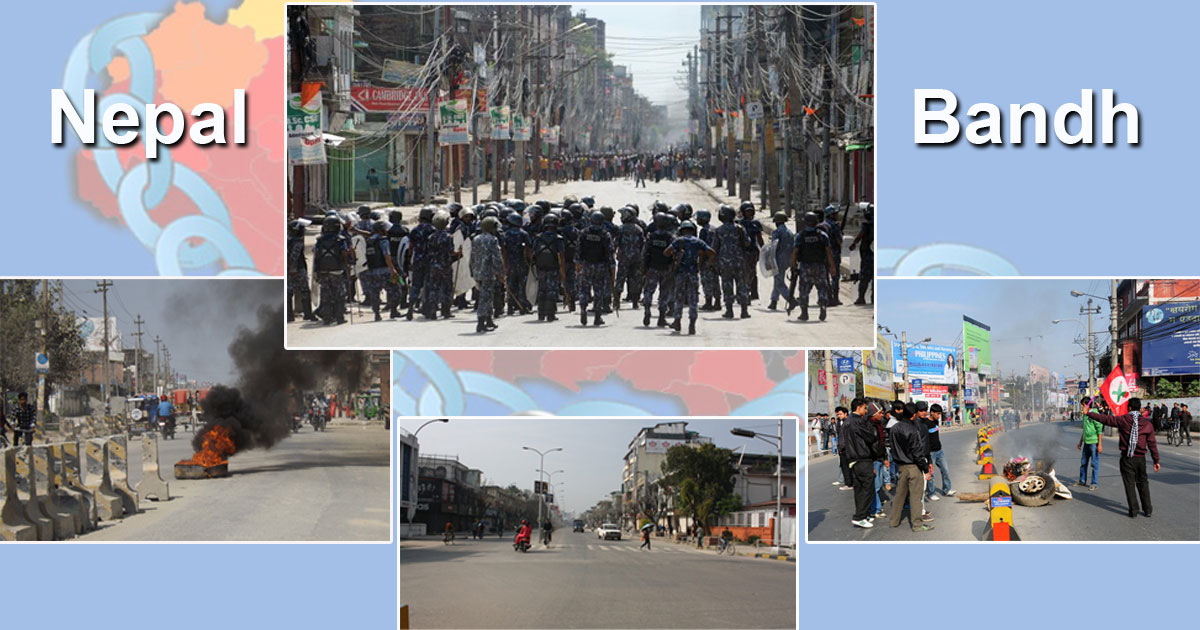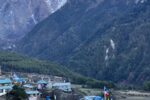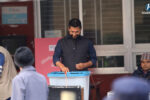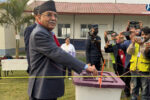KATHMANDU: Political parties in Nepal along with their affiliated organizations have been resorting to ‘Nepal bandh’ for decades. This has been used as a tool to get their political demands fulfilled.
The year 1990 ( 2046 BS) saw a political upheaval in Nepal which led to change in the government from monarchy to democracy. Democratic parties were in streets of Nepal exhorting common citizens to join them and they did that successfully. Nepal bandh was announced by them in order for their political goals to be accomplished. The trend of calling ‘Nepal bandh’ has seen a rise in numbers every year in the last three decades. Although all the political parties of Nepal and other organizations had agreed not to resort to ‘Nepal bandh’, it has never been implemented on the ground.
Nepal Communist Party (Biplav) has been announcing ‘Nepal bandh’ at every now and then even at the drop of a needle in recent past. Even business and professional demands pressed by interest and professional groups are going for ‘Nepal bandh’ with or without the combinations of road blockade, educational strike, and transport strike. A political outfit led by Biplav, though the government of Nepal has outlawed the party and its activities, has been stubbornly fighting the government by resorting to ‘Nepal bandh’ defying the law enforcing agencies for achieving its political goals.
The Biplav group has been protesting the killing of their political workers and demanding release of their imprisoned workers. Nepal Police confirms, not less than 21 days were consumed into ‘Nepal bandh’ called forth by Biplav group at different occasions in the last three years. Being a non-political outfit, Biplav group shows scant respect towards the commitment of not stopping a country in its ongoing journey on the path of social and economic development by pressing ‘Nepal bandh’ in action.
The present ruling party Nepal Communist Party has also come in the power from streets of Nepal by calling for ‘Nepal bandh’ several times on several occasions. The political parties which have frequently called for ‘Nepal bandh’ are none other than CPN-UML and CPN-Maoist (center) combined together called Nepal Communist Party — the present ruling party of Nepal. These parties kept the whole country ‘immobile and standstill’ through their call for ‘Nepal bandh’ as a pressure technique to get their political demands fulfilled. Today’s Biplav was then one of the loved members and source of strength for existing vestiges of Maoist leaders currently working together with the UML leaders into a newly formed ‘Nepal Communist Party’.
First Nepal Bandh for conducting a referendum in the country:
The first Nepal bandha on March 27, 1980, was called for dismantling dictatorial Panchayat System in Nepal, first introduced by King Mahendra and perpetuated by his son King Birendra. General Secretary of CPN-UML C. P. Mainali says, “All the political parties then together with their affiliates and a range of students unions exhorted ‘Nepal bandh’ for establishing parliamentary democratic country by replacing autocratic Panchayati system being run by the Shah-monarch.”
To press for democracy in Nepal in support of democratic political parties, India imposed an economic blockade on the country in 1990. Political parties in Nepal in those days pressed for ‘Nepal bandh’ demanding answers from the then King why the monarchical regime invited economic blockade from a neighboring country. No doubt, the ‘Nepal bandh’ resorted to in the year 1980 was the first nationwide strike in the history of Nepal.
The whole system of monarchy and the then Prime Minister Surya Bahadur Thapa had felt the ‘heat’ of the first ‘Nepal bandh’. Seeing the vast sea of people in a mass rally of students, the then King Birendra announced a public referendum on May 2, 1980, explains C. P. Mainali adding further that those were the days when Nepal bandh was called for genuine political demands as a mark of peaceful political protest. “It was not the way Nepal bandh is being exhorted today for realizing petty political goals,” laments Mainali.
It is illusion amongst many political outfits operating in Nepal at this moment that calling Nepal bandh puts pressure on the government to come into action immediately, says Nepal Communist Party leader Jagannath Khatiwada adding further, “It was difficult days in yesteryears as we were being ruled by the unitary political system; now we are in multiparty democratic system with all the fundamental rights. So, there is no much relevance for resorting to Nepal Bandh.”
CPN-Maoists resorted to ‘Nepal bandh’ for a long 23 days to topple down the Madhav Kumar Nepal-led government. During the Maoist conflict from December 2004 to March for 3 months in a stretch, though the Maoists were going through the peace process, called for Nepal bandh quite frequently.
Similarly, CPN-UML opted for political tactics of Nepal bandh for 5 continuous days in order to topple down the government of Girija Prasad Koirala in the year 1997. CPN-UML after its government fell down in 1995, went for Nepal bandh again and again for long nine months. After that, a group of 7 political parties in the year 2006, hit the streets of Nepal for a period of 19 days in a mass movement and those were the occasions Nepal Bandh were routine affairs.









Comment